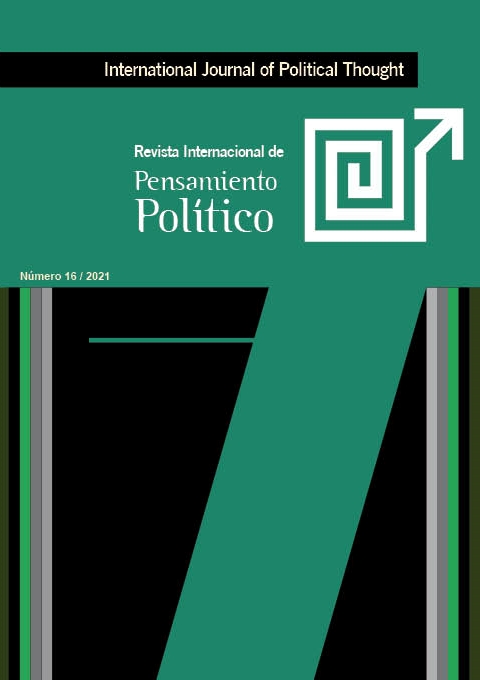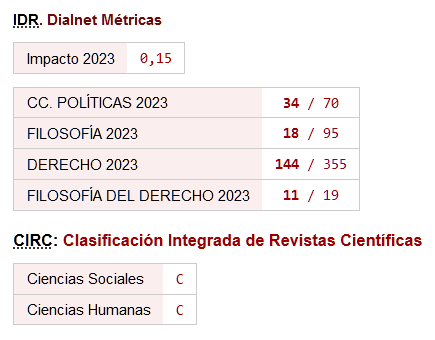Laicismo: trampa de idolatría o nihilismo constitucional
DOI:
https://doi.org/10.46661/revintpensampolit.6043Palabras clave:
laicismo, idolatría constitucional, nihilismo constitucional, religión y Estado bajo el Antiguo Régimen, religión y la Revolución francesaResumen
Soberanía y laicismo son dos conceptos que están adquiriendo protagonismo en los debates públicos de su país nativo, Francia. Este artículo propone abordar ambos desde dos perspectivas. La primera, etimológica, que intenta indagar el origen del concepto de «laicismo» desde el siglo XV y construir una definición conforme a su uso dado durante el Antiguo Régimen y durante el primer siglo de la revolución, hasta la ley de neutralización-emancipación de 1905, pasando por la envoltura normativa del Estado con la religión, el populistamente denominado Estado laico. La segunda, poner de relieve el antagonismo que suponía la convivencia de ese término con la soberanía propugnada por la revolución y los postulados centristas de los imperios que alimentaron la ideología de la ley de separación de 1905. La conclusión que se pretende alcanzar, y enlazar para sucesivos trabajos, es que el resurgimiento del concepto y su asalto a la Constitución de 1958 consiste en un antagonismo, tanto con su etimología como con la propia constitución, causando, más que idolatría, un entramado de nihilismo constitucional, o incluso una especie de blasfemia normativa a favor del populismo político.
Descargas
Citas
Alnasir, S. (2019). Concepto jurídico, Religión y Secularidad: Los casos de Israel, Egipto e Iraq. Universidad Carlos III de Madrid.
Alnasir, S. (2021a). Calamidades del Derecho (post)Colonial y su Orientalismo: Religión, Identidad y libertad individual en Egipto, Iraq y Túnez. Boletín Mexicano de Derecho Comparado, 158, 485-519. Disponible en: https://doi.org/10.22201/iij.24484873e.2020.158.15627.
Alnasir, S. (2021b). Cuando el populismo también es colonial, A propósito de Napoleón en Egipto. Revista Mexicana de Ciencias Políticas y Sociales, 1-30.
Baubérot, J. (s. f.). La laïcité en France, Histoire et défis actuels (pp. 27-48). Disponible en: https://utcp.c.u-tokyo.ac.jp/publications/pdf/UTCPBooklet7_027-048_.pdf
Baubérot, J. (2010). Histoire de la laïcité en France. Presses Universitaires de France. Disponible en: https://www.cairn.info/histoire-de-la-laicite-en-france--9782130581253.htm
Bignon, L.-P.-É. (1838a). Histoire de France sous Napoléon: Deuxième époque, depuis la paix de Tilsitt, en 1807, jusqu’en 1812 (Vol. 7). Firmin Didot.
Bonaparte, N. (1859). Correspondance de Napoléon Ier.: Vol. III. Plon. Disponible en: https://gallica.bnf.fr/ark:/12148/bpt6k6295853m
Bonaparte, N. (1860). Correspondance de Napoléon Ier: Vol. IV. Imprimerie Impérial. Disponible en: https://gallica.bnf.fr/ark:/12148/bpt6k9636650x.
Bonaparte, N. (1861). Correspondance de Napoléon Ier.: Vol. IX. Plon. Disponible en: https://gallica.bnf.fr/ark:/12148/bpt6k6294056s
Buchez, P.-J.-B. (1835). Histoire parlementaire de la révolution française, ou, Journal des Assemblées nationales depuis 1789 jusqu’en 1815, la narration des événemens. Paulin.
Buisson, F. (1938). Une lettre de Ferdinand Buisson à Hugo sur la laïcité, 1869. En La Révolution de 1848 et les révolutions du XIXe siècle (Vol. 35, pp. 228-231). Persée - Portail des revues scientifiques en SHS. Disponible en: https://www.persee.fr/doc/r1848_1155-8806_1938_num_35_167_1328_t1_0228_0000_1
Burdeau, G. (1970). L’État. Le Seuil.
CCF Cerf c. Gougendheim, (Cour de Cassation Française 8 de marzo de 1846).
CCF Mohamed-Amokran-Oukaci, (Cour de Cassation Française 20 de mayo de 1882).
Commaille, J. (1991). Normes Juridique et Régulation sociale retour à la sociologie générale. En F. Chazel & J. Commaille (Eds.), Normes juridiques et régulation sociale (p. 13). L.G.D.J.
Comte, A. (1852). Système de politique positive ou Traité de sociologie, instituant la religion de l’humanité: Vol. II. Carrillan. Disponible en: https://gallica.bnf.fr/ark:/12148/bpt6k61194887
Conde, F. J. (1935). El pensamiento político de Bodino. Anuario de historia del derecho español, 12, 5-96. Disponible en: https://dialnet.unirioja.es/servlet/articulo?codigo=2057266
Condis, P., & André, M. (1901). Dictionnaire de droit canonique et des sciences en connexion avec le droit canon: Vol. II (III). Hippolyte Walzer.
Constant, B. (1818). Collection complète des ouvrages, publiés sur le gouvernement représentatif et la constitution actuelle de la France: Formant une espèce de cours de politique constitutionnelle: Vol. I. Plancher.
Duguit, L. (1928). Traité de Droit Constitutionnel: Vol. II (III). Ancienne Libraire Fontemoing.
Engisch, K. (1960). El ámbito de lo no jurídico (E. Garzón Valdés, Trad.). Universidad Nacional de Córdoba.
Grey, T. C. (1984). The Constitution as Scripture. Stanford Law Review, 37(1), 1-25. Disponible en: https://doi.org/10.2307/1228651
Hobbes, T. (1999) [1660]. Tratado sobre el ciudadano (J. Rodríguez Feo, Trad.). Trotta.
Jones, B. C. (2020). Constitutional Idolatry and Democracy: Challenging the Infatuation with Writtenness. Edward Elgar Publishing.
Juri, Y. (2020). La soberanía como fundamento de la república en Jean Bodin: Una perspectiva jurídica. Scripta Mediaevalia - Revista de Pensamiento Medieval, 13(1). Disponible en: http://revistas.uncu.edu.ar/ojs/index.php/scripta/article/view/3594/2890
Kelsen, H. (2000) [1934]. Teoría Pura del Derecho (M. Nilve, Trad.). Eudeba.
Latreille, A. (1935). Napoléon et le Saint-Siège, 1801-1808: L’ambassade du Cardinal Fesch à Rome. Félix Alcan. Disponible en: https://gallica.bnf.fr/ark:/12148/bpt6k3384102x
Levinson, S. (2011). Constitutional Faith. Princeton University Press.
Malberg, C. (1962). Contribution à la théorie Générale de l’État. CNRS.
Mathiez, A. (1927). La corruption parlementaire sous la terreur (II). Armand Colin.
Maury, L. (2012). Ferdinand Buisson et La Foi laïque. Bibnum. Textes fondateurs de la science. http://journals.openedition.org/bibnum/800
Müller, J.-W. (2012). Militant Democracy. En M. Rosenfeld & A. Sajó (Eds.), The Oxford Handbook of Comparative Constitutional Law. Oxford University Press. Disponible en: https://doi.org/10.1093/oxfordhb/9780199578610.013.0062
Müller, J.-W. (2016). Protecting Popular Self-Government from the People? New Normative Perspectives on Militant Democracy. Annual Review of Political Science, 19(1), 249-265. Disponible en: https://doi.org/10.1146/annurev-polisci-043014-124054
Nancy, J.-L. (2003). Au fond des images. Galilée.
Nicolet, C. (1982). L’idée républicaine en France, 1789-1924: Essai d’histoire critique. Gallimard.
Pablo II. (1965). Decreto Apostolicam Actuositatem sobre el Apostolado de los Laicos. Vaticano. Disponible en: http://www.vatican.va/archive/hist_councils/ii_vatican_council/documents/vat-ii_decree_19651118_apostolicam-actuositatem_sp.html
Peillon, V. (2010). Une religion pour la République: La foi laïque de Ferdinand Buisson. Seuil.
Pendás, B. (2020). Soberanía: El eterno retorno de Juan Bodino. Revista de las Cortes Generales, 105-124. Disponible en: https://doi.org/10.33426/rcg/2020/109/1527
Proudhon, P.-J. (1858a). De la justice dans la Révolution et dans l’Église. Libraire de l’Office de Publicité.
Proudhon, P.-J. (1858b). La justice poursuivie par l’Église: Appel du jugement rendu par le tribunal de police correctionnelle de la Seine, le 2 juin 1858, contre P.-J.
Proudhon. Libraire de l’Office de Publicité.
Robespierre, M. (1840). Oeuvres de Maximilien Robespierre: Vol. I (A. Laponneraye, Ed.). Fauboug Saint-Denis. Disponible en: https://gallica.bnf.fr/ark:/12148/bpt6k1411602m
Sevestre, É. (1905). L’histoire, le texte et la destinée du Concordat de 1801. Lethieleux ed.
Spencer, H. (1993). Le droit d’ignorer l’état. Les Belles Lettres.
Troper, M. (1994). Pour une Théorie Juridique de l’État. Presses Universitaires de France.
Troper, M. (2001). La théorie du Droit. Presses Universitaires de France.
Vacherot, É. (1858). La démocratie. Chamerot.
Viehweg, T. (1964). Tópica y Jurisprudencia (L. Diez-Picazo Ponce de Leon, Trad.). Taurus.
Weber, M. (2014). Economía y sociedad (J. M. Echavarría, J. R. Farella, E. Ímaz, E. G. Máynez, & J. F. Mora, Trads.). Fondo de Cultura Económica.
Weill, G. (1915). L’anticléricalisme sous le socond Empire. Revue des études napoléoniennes, VIII(2), 56-84. Disponible en: https://gallica.bnf.fr/ark:/12148/bpt6k15484b
Zagrebelsky, G. (1995). El derecho dúctil: Ley, derechos, justicia (M. Gascón, Trad.). Trotta.
Descargas
Publicado
Cómo citar
Número
Sección
Licencia
Derechos de autor 2022 Samer Alnasir

Esta obra está bajo una licencia internacional Creative Commons Atribución-NoComercial-CompartirIgual 4.0.
Política de acceso abierto
Se permite el acceso libre y abierto de cualquier interesado a todos los contenidos de los números de la revista, sin costo alguno, pudiendo imprimir y trasladar todos los artículos, con la única condición de precisar la fuente y la autoría.
La revista: a) no cobra a las autorías costes por el procesamiento de los artículos ni por el envío de los mismos, b) mantiene el copyright para los autores sin restricciones, c) facilita a los autores conservar sus derechos de publicación sin limitaciones.
La Revista Internacional de Pensamiento Político es una obra original del Laboratorio de Ideas y Prácticas Políticas de la Universidad Pablo de Olavide. Todos los artículos incluidos en la Revista son obra original de sus respectivas autorías. Esta Revista se ofrece libremente a la comunidad científica y académica sin coste alguno y libera los contenidos de acuerdo a la licencia "Reconocimiento-NoComercial-CompartirIgual 4.0 CC BY-NC-SA" del proyecto Creative Commons dispuesta en la siguiente url: https://creativecommons.org/licenses/by-nc-sa/4.0/legalcode
Si deseas traducir o compilar alguno de los artículos aquí disponibles, por favor, ponte en contacto













